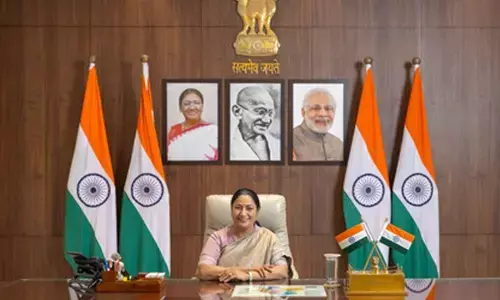Can't police prevent a murder?

Picture used for representational purpose only
The broad daylight murder of a 20-year-old B Tech woman student in the suburbs of Guntur on the forenoon of Independence Day sent ripples of shock waves amidst the sea of concerned citizens since the ghastly incident was not only barbaric but also fear-spewing.
The broad daylight murder of a 20-year-old B Tech woman student in the suburbs of Guntur on the forenoon of Independence Day sent ripples of shock waves amidst the sea of concerned citizens since the ghastly incident was not only barbaric but also fear-spewing. The reason was because of the fact that a normally looking initial scene of a bike-borne culprit with unknown criminal intent meeting with the unsuspecting girl turned all of a sudden into a horrific stabbing sequence.
Her subsequent death drew the attention of the higher-ups of State government including Home Minister who took notice of the killing seriously and visited the hospital to see the body of the victim. In such circumstances, people in general will have usually a prima facie view that it is the failure of police as though the law enforcement agency is something like omniscient and omnipotent.
Here the frank question is whether the police is all-powerful to prevent each and every offence on earth despite their best honest performance and if so, why the heck that the volume of criminality is surging day by day? If not, where is exactly the key that can unlock the mysteries of unabated evils and persistent disorders for eventual foolproof solutions.
It is only half-truth if we judge that police alone has to bear the onus of preventing crime and maintaining peace and order in society. The other half of truth is about who else are others having an obligation to perform these noble duties. And the answer simply is that both the criminal justice system and the public at large figure in to share the onerous responsibility since the role of police, though seminal, is only limited in its operation from a holistic perspective.
As peace and order connote a harmonious social living, signifying a sense of congenial social environment, devoid of interpersonal conflicts, it has been held that fraternal concord is the time-tested requirement which is the most important of all pillars of morality. According to the recent Global Peace Index, 2021, Iceland continues to be the most peaceful country as the tensions among the economic classes or individuals therein are almost non-existent. Of those countries having more than 10 crore population, Japan has taken the number one spot though it secures the 9th rank on the overall list. India shows up at the 135th position among the 163 nations surveyed, with Afghanistan at the bottom.
Coming to the existing scenario of never ending maladies of socio-economic nature such as on and off unrest rooted in livelihood crises, group tensions, acts of extremism, terrorism etc., pose insurmountable challenges to police for ensuring harmony, peace and order. High crime rates are ordinarily observed in areas where the levels of poverty and joblessness are intense. Such violence-prone conditions normally call for extensive security arrangements and deterrent punishments so that crime rates are kept under check.
When the society thrusts heightened pressure into police working to curb offensive behaviour and disorderliness among the unruly elements without remedying the basic causes of the problems, it becomes a real tough situation for police as they invariably find themselves torn between Scylla and Charybdis. On one side, the legal dictates tend to drive them on to 'quell or hell' mode to nip the crime in bud without resorting to human rights violations whereas on the other side, the disgruntled masses don't extend their bit of assistance either in intelligence collection or in following the rules and regulations spiritedly.
Holistically speaking, we can point out that peace and order can best be maintained through a four-fold methodical strategy namely pre-emptive (to see that no discord arises between potential offender and potential victim), preventive (guarding against the unwanted action of the potential offender), proactive (protecting the potential victim) and lastly as a last resort, reactive (responding to a tense situation between the offender and the victim).
Pre-emptive action being the most potent, solely rests on the local administration so as to ensure, say for example, that the farmers living through drought season don't stage demonstrations as their demands might have already been taken care of by the authorities or that the laid-off workers don't involve in violent disturbances as they too might have been assured of re-employment in another establishment. Thus, a large chunk of potential crimes and probable social unrest would disappear, relieving police of such critical plights that are beyond their means to thwart.
Now, the issue that remains to be examined is about how well the preventive, proactive and reactive aspects of crime minimisation could be handled. If we metaphorically compare the whole gamut of social peace, harmony and order to a train, we can infer that it runs on the rails of extrinsic and intrinsic disciplines respectively, which are parallel to each other. If either of the two is missing or not up to the mark, derailment of collective objective will take place.
Here, extrinsic discipline refers to the police action in accordance with the provisions of laws. Intrinsic discipline is concerned about virtues, values, conscience etc, that are either learned or inculcated for self-control and proper social conduct. A major UK study focused on a group of 700 young people of 13 to 17 years of age, over a span of five years, and found inverse relationship between ethicality and criminal attitude.
Researchers Wikstrom, Oberwittler, Trieber and Hardie described in their book 'Breaking Rules' about the crucial role of personal morality in shaping up one's humane conduct. They found that the most crime-prone young people were the ones who spent their adolescence unsupervised, making them situationally vulnerable to opportunities to commit crimes. But the crime-averse young people were situationally resistant to opportunities for commission of crime because they had a strong personal morality, built up over time through ideal socialisation processes.
Therefore, policing is not something that is singlehandedly dealt with by police alone but it is a shared effort, which is deeper in vision and wider in implementation. If the civil administration acts as vaccine so as to provide immunity to society against preventable agitations and survival problems, the people can become eyes and ears of the police so as to help them control crime confidently.
However, police shall always take the lead and initiative to convince and involve all the stakeholders wherever necessary in the course of their endeavours so that crime and disorder are forestalled since police efficiency ultimately lies in the absence of the same but not in the visible evidence of fighting criminals and controlling protesting mobs. But strangely, society appreciates only when the criminal is apprehended and not when there prevails crime-less peacefulness. Is good policing then not a victim of its own success?
(The author a retired IPS officer is former DGP, Madhya Pradesh)








